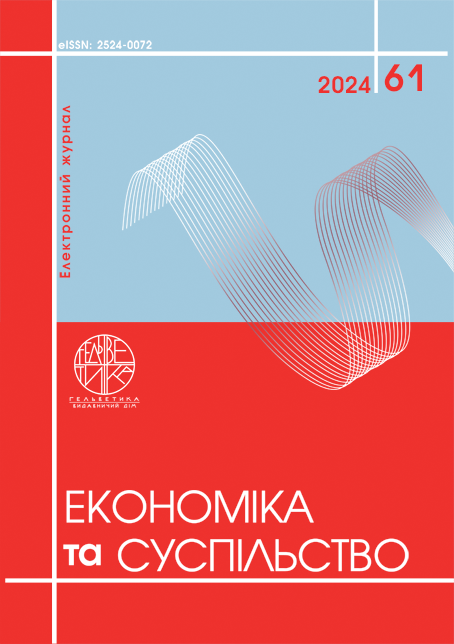INFLUENTIAL FACTORS ON BALANCED ENTERPRISE DEVELOPMENT IN THE CONTEXT OF CIRCULAR ECONOMY PRIORITIES
Abstract
The article is dedicated to analyzing the factors influencing balanced enterprise development. In the context of a circular economy aimed at waste minimization and maximal resource utilization, understanding these factors is crucial for forming effective entrepreneurial strategies that take into account not only economic benefits but also environmental sustainability and social responsibility. These factors include: resource efficiency, innovation in business processes and technologies, environmentally conscious waste management, supply chain interaction, material reuse and recycling, product design sustainability, green marketing, corporate social responsibility, regulatory and political environment. Through the lens of global and local examples, including companies from France, the United Kingdom, the United States, Canada, and Ukraine, it is demonstrated that resource efficiency, innovation in processes and technologies, environmentally conscious waste management, supply chain interaction, material reuse and recycling, product design sustainability, adoption of green marketing, corporate social responsibility, and the regulatory and political environment directly impact sustainable business development. It is argued that these factors are interconnected and collectively contribute to the formation of the foundations of a circular economy, where not only economic success but also responsibility towards society and the environment are paramount. Through the examples of the mentioned companies, it is argued that integrating sustainability into production, innovation, environmental initiatives, social responsibility, as well as compliance with regulatory standards, is not only voluntary ethics but also a strategic necessity for achieving long-term success. It is critically important for modern enterprises to consider these factors to ensure their competitiveness and sustainable future within the context of their business model. This will not only contribute to environmental preservation and social welfare but also provide a competitive advantage and a sustainable future for the enterprise. Thus, sustainability and circularity in the economy cease to be an alternative but become an integral part of modern business practice.
References
Боровий А. І. Сталий розвиток підприємництва: етапи та інструменти впровадження. Збірник наукових праць Черкаського державного технологічного університету. Серія: Економічні науки. 2018. Вип. 51. С. 89–94. DOI: https://doi.org/10.24025/2306-4420.0.51.2018.153504 .
Вецко Т.М. Сталий розвиток підприємства: проблеми та перспективи. Актуальні проблеми економіки та управління. 2019. № 13. URL: http://ape.fmm.kpi.ua/article/view/153856.
Гречко А., Очеретяна О. Дослідження еволюції наукової думки в аспектах визначення сутності поняття «сталий розвиток підприємства». Підприємництво та інновації. 2020. Вип. 15. С. 37–41. DOI: https://doi.org/10.37320/2415-3583/15.6.
Лихолат С. М., Семенюк Л. О. Циркулярна економіка як напрям промислової модернізації: передовий міжнародний досвід. Бізнес, інновації, менеджмент: проблеми та перспективи: збірник тез доповідей ІІ Міжнародної науково-практичної конференції (м. Київ, 22 квітня 2021 р.). Київ, 2021. С. 178–179. URL: http://surl.li/snigp
Мущинська Н.Ю. Збалансований розвиток регіону: теоретичний аспект. Ефективна економіка. 2014. № 2. URL: http://www.economy.nayka.com.ua/?op=1&z=3383.
Borovyi A. I. (2018) Stalyi rozvytok pidpryiemnytstva: etapy ta instrumenty vprovadzhennia [Stable development of enterprise: steps and instruments of implementation]. Zbirnyk naukovykh prats Cherkaskoho derzhavnoho tekhnolohichnoho universytetu - Proceedings of Scientific Works of Cherkasy State Technological University. Seriia: Ekonomichni nauky - Economic Sciences. vol. 51, pp. 89–94. DOI: https://doi.org/10.24025/2306-4420.0.51.2018.153504
Vetsko T.M. (2019) Stalyi rozvytok pidpryiemstva: problemy ta perspektyvy [Sustainable development of the enterprise: problems and prospects]. Aktualni problemy ekonomiky ta upravlinnia - Actual problems of economics and management. vol. 13. Available at: http://ape.fmm.kpi.ua/article/view/153856 .
Hrechko A., Ocheretiana O. (2020) Doslidzhennia evoliutsii naukovoi dumky v aspektakh vyznachennia sutnosti poniattia «stalyi rozvytok pidpryiemstva» [Economic essence of the concept of «sustainable enterprise development»]. Pidpryiemnytstvo ta innovatsii - Entrepreneurship and Innovation, vol. 15, pp. 37–41. DOI: https://doi.org/10.37320/2415-3583/15.6 .
Lykholat S. M., Semeniuk L. O. (2021) Tsyrkuliarna ekonomika yak napriam promyslovoi modernizatsii: peredovyi mizhnarodnyi dosvid [Circular economy as a direction of industrial modernization: advanced international experience]. Biznes, innovatsii, menedzhment: problemy ta perspektyvy - Business, innovation, management: problems and prospects. Zbirnyk tez dopovidei II Mizhnarodnoi naukovo-praktychnoi konferentsii (Kyiv, April, 22, 2021), pp. 178–179. Available at: http://surl.li/snigp .
Mushchynska N.Iu. (2014) Zbalansovanyi rozvytok rehionu: teoretychnyi aspekt [Balanced development of a region: theoretical aspect]. Efektyvna ekonomika. vol. 2. Available at: http://www.economy.nayka.com.ua/?op=1&z=3383 .

This work is licensed under a Creative Commons Attribution 4.0 International License.


